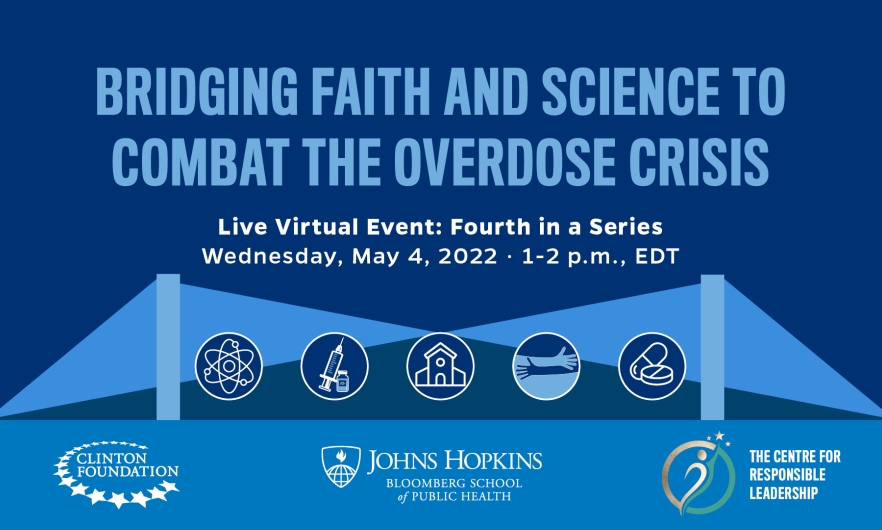Johns Hopkins Bloomberg School, Clinton Global Initiative, And Centre for Responsible Leadership to Host Convening on Empowering Faith Leaders to Act on Overdose Crisis
The event will be streamed here beginning at 1 p.m. EDT on May 4

Faith and science leaders will convene for the fourth virtual event in the series “Bridging Faith and Science to Combat the Overdose Crisis,” co-hosted by the Clinton Global Initiative’s Overdose Response Network, the Johns Hopkins Bloomberg School of Public Health, and The Centre for Responsible Leadership. This quarterly discussion will focus on harm reduction, strategies to reduce substance use disorders, and how to reverse a dangerous trend of increasing overdose deaths.
The COVID-19 pandemic has exacerbated the U.S. overdose crisis, with an estimated 100,000 lives lost to opioid overdose in 2021, a 28.5 percent increase over 2019. Through collaboration with the Clinton Foundation, the Bloomberg School, and The Centre for Responsible Leadership, national leaders from science and faith communities join forces to provide research and critical support to communities impacted by substance use disorders to shatter stigma, educate about prevention, provide resources, and help improve and save lives.
WHAT: “Bridging Faith and Science to Combat the Overdose Crisis” virtual series
WHEN: Wednesday, May 4, 2022
WHO:
- Chelsea Clinton, Vice Chair, Clinton Foundation
- Ellen J. MacKenzie, Dean, Johns Hopkins Bloomberg School of Public Health
- Dr. Cheryl Fishbein, Member, Leadership Council, The Centre for Responsible Leadership
- Susan Sherman, Professor, Department of Health, Behavior and Society, Johns Hopkins Bloomberg School of Public Health
- Rev. Edwin Sanders, Senior Servant and Founder, Metropolitan Interdenominational Church, Nashville, Tennessee
The primary goal of harm reduction is to save lives and protect the health of both people who use drugs and their communities. Harm reduction acknowledges that drugs are widely available in our society and that traditional law enforcement approaches and complete abstinence do not decrease demand, use, or negative health consequences of substance use. Effective harm reduction tools include free syringe service programs, overdose prevention sites, fentanyl tests, naloxone kits, education on safer substance use, health and social support groups, and many others.
Panelists Susan Sherman and Reverend Edwin C. Sanders both have significant experience with harm reduction approaches. Sherman has worked for years with marginalized communities, particularly sex workers and people who use drugs. Since 1984, Rev. Sanders and the Metropolitan Interdenominational Church have led outreach ministries in the areas of substance use, advocacy for children, sexual violence, and harm reduction; since 1992, they have provided medical outreach to people affected by HIV/AIDS through the First Response Center.
The Overdose Response Network is part of the Clinton Global Initiative’s mission to bring together a community of doers from across a broad section of society not only to discuss our world’s most pressing challenges but also to commit publicly to take specific, practical, measurable actions to address them.
The “Bridging Faith and Science to Combat the Overdose Crisis” began with an event on May 4, 2021, which can be found here; the second event, held September 20, 2021, is here; and the third event, held February 1, 2022, is here.
# # #
Media contacts: Carly Kempler at ckemple2@jhu.edu and Robin Scullin at rsculli1@jhu.edu.





